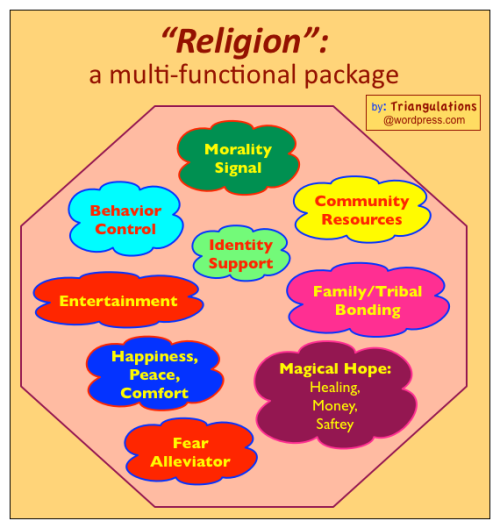
As I illustrate above, what people call “religion” contains much more than doctrines and beliefs. “Morality Signaling” is one of those many components.
People use religion to signal to others that “I am safe”, “I am moral”, “I am an upright citizen” and more. They use the jargon, they mis-report about attendance, and more. Not only do they use religion to signal to others that they are moral, but they also use it to comfort themselves, to signal their other selves. (see my Many Selves posts).
Tom Rees reviews an article that shows that students underestimate their drinking after simply being asked about their religion first. In other words, once the religion switch is toyed with, people are view themselves as more “moral” than they really are. Not that drinking alcohol is immoral!
As I illustrate above, what people call “religion” contains much more than doctrines and beliefs. “Morality Signaling” is one of those many components.
People use religion to signal to others that “I am safe”, “I am moral”, “I am an upright citizen” and more. They use the jargon, they mis-report about attendance, and more. Not only do they use religion to signal to others that they are moral, but they also use it to comfort themselves, to signal their other selves. (see my Many Selves posts).
Tom Rees reviews this research that shows that students underestimate their drinking after simply being asked about their religion first. In other words, once their religion switch is flickered, people view themselves (or present themselves) as more “moral” than they really are — with “moral” meaning
“being consistent with their religious values.”, and not that drinking alcohol is immoral!




































This line of analysis is new to me — looks useful. I’d like to see it pushed a little further on the sociological side (social control by an elite). And, the cross over to theology (functioning as a primitive cosmology) might be an additional dimension to the map. Is its role as an antidote for fear of the death and ancestors implicit in that map?
The point about signalling to your other selves is important, I think. Is that your own insight, or is there a source for it? TIA
While I’m not quite sure how to articulate the connection, your post reminds me of another article I ran across recently: an account comparing behavior of professional ethicists to that of other academics, and finding very little difference.
@ David,
Yes, that is totally my own. It is also similar to how I think of morality. See this post.
@ egyoung,
Sure, control can happen through elite or anyone, Fear of death is covered by “fear alleviator”
BTW, I removed the link in your name because it lead to an empty blog
Interesting post! I ran across an article recently that has the same flavor as this one, though without the religious aspect. In both cases, there’s an interesting mismatch among the ways we think of morality within different parts of ourselves.
I recently ran across another article which had a similar flavor. In so many cases, the way we view ethics changes depending on which “self” we are at the moment.
@ CRL :
Sorry, I found your comments in my spam (they were the only ones that were genuine — not sure why.) I kept all three, though the link is the same. I enjoyed how you put the comment 3 different ways — I’ve done that before too on other sites.
Yes, I knew that article — about 8 years ago, I think.
I agree with your comparison. Here is a post where I draw a submarine and liken to the way we partition our lives.
@CRL,
Interesting article — yes, I am in agreement with the fellow. Fun writing. Thank you.